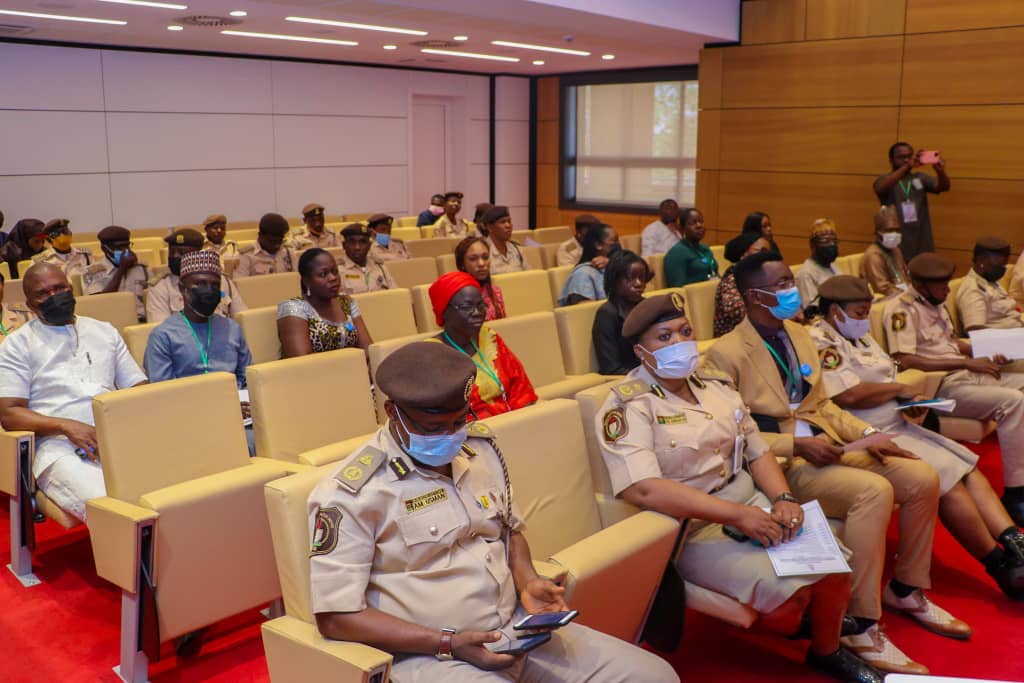News
Insecurity: FG Orders Total Overhaul Of SIM Card Registration

The Federal Government has directed the Nigerian Communications Commission (NCC) to immediately revise the policy on SIM Card registration and usage.
The Minister of Communications and Digital Economy, Dr. Isa Ibrahim Pantami gave the directive in a statement signed by his Technical Assistant, Information Technology, Dr. Femi Adeluyi, yesterday.
He said that the directive was in line with the powers of the minister as stated in Section 25(1) of the Nigerian Communications Act 2003 – which stipulates that: “the minister shall, in writing, from time to time notify the commission or and express his views on the general policy direction of the Federal Government in respect of the communications sector.”
According to the statement, ‘’the revision of the policy is based on the feedback received from the security agencies following the successful revalidation of improperly registered SIM cards in September, 2019, and the blocking of those that failed to revalidate their SIMs.’’
With this directive, the updated policy from NCC is expected to include the following provisions, amongst others: “ensure that the National Identity Number (NIN) becomes a prerequisite for Nigerians registering new SIM cards (while for foreigners, their passports and visas should be used), while already registered SIM cards are to be updated with National Identity Number (NIN) before 1st December, 2020”.
It is also to; “ensure that only fully accredited agents support the SIM card registration process without pre-registering SIM cards themselves, while the eventual registration should be done by the operators; there should be a maximum number of SIM cards that can be tied to a single individual, possibly a maximum of 3; ensure that no unregistered SIMs are ever allowed on mobile networks; ensure that subscribers can easily check the number of SIM cards registered to their name, along with the associated phone numbers and networks”.
Also, the industry regulator is to ensure that mobile network operators fortify their networks against cyber attacks, and ensure that they adhere to the provisions of the Nigeria Data Protection Regulation (NDPR); and ensure that SIM cards that have been used to perpetrate crimes are permanently deactivated.
In the light of this development, the statement informed that NCC is to provide the minister with progress reports on the implementation of the revised policy.
News
FG Ends Passport Production At Multiple Centres After 62 Years

The Nigeria Immigration Service has officially ended passport production at multiple centres, transitioning to a single, centralised system for the first time in 62 years.
Minister of Interior, Dr Olubunmi Tunji-Ojo, disclosed this yesterday while inspecting Nigeria’s new Centralised Passport Personalisation Centre at the NIS Headquarters in Abuja.
He stated that since the establishment of NIS in 1963, Nigeria had never operated a central passport production centre, until now, marking a major reform milestone.
“The project is 100 per cent ready. Nigeria can now be more productive and efficient in delivering passport services,” Tunji-Ojo said.
He explained that old machines could only produce 250 to 300 passports daily, but the new system had a capacity of 4,500 to 5,000 passports every day.
“With this, NIS can now meet daily demands within just four to five hours of operation,” he added, describing it as a game-changer for passport processing in Nigeria.
“We promised two-week delivery, and we’re now pushing for one week.
“Automation and optimisation are crucial for keeping this promise to Nigerians,” the minister said.
He noted that centralisation, in line with global standards, would improve uniformity and enhance the overall integrity of Nigerian travel documents worldwide.
Tunji-Ojo described the development as a step toward bringing services closer to Nigerians while driving a culture of efficiency and total passport system reform.
He said the centralised production system aligned with President Bola Tinubu’s reform agenda, boosting NIS capacity and changing the narrative for better service delivery.
News
FAAC Disburses N2.225trn For August, Highest In Nigeria

The Federation Account Allocation Committee (FAAC) has disbursed N2.225 trillion as federation revenue for the month of August 2025, the highest ever allocation to the three tiers of government and other statutory recipients.
This marks the second consecutive month that FAAC disbursements have crossed the N2 trillion mark.
The revenue, shared at the August 2025 FAAC meeting in Abuja, was buoyed by increases in oil and gas royalty, value-added tax (VAT), and common external tariff (CET) levies, according to a communiqué issued at the end of the meeting.
Out of the N2.225 trillion total distributable revenue, FAAC said N1,478.593 trillion came from statutory revenue, N672.903 billion from VAT, N32.338 billion from the Electronic Money Transfer Levy (EMTL), and N41.284 billion from Exchange Difference.
The communiqué revealed that gross federation revenue for the month stood at N3.635 trillion. From this amount, N124.839 billion was deducted as cost of collection, while N1,285.845 trillion was set aside for transfers, interventions, refunds, and savings.
From the statutory revenue of N1.478 trillion, the Federal Government received N684.462 billion, State Governments received N347.168 billion, and Local Government Councils received N267.652 billion. A further N179.311 billion (13 per cent of mineral revenue) went to oil-producing states as derivation revenue.
From the distributable VAT revenue of N672.903 billion, the Federal Government received N100.935 billion, the states received N336.452 billion, while the local governments got N235.516 billion.
Of the N32.338 billion shared from EMTL, the Federal Government received N4.851 billion, the States received N16.169 billion, and the Local Governments received N11.318 billion.
From the N41.284 billion exchange difference, the Federal Government received N19.799 billion, the states received N10.042 billion, and the local governments received N7.742 billion, while N3.701 billion (13 per cent of mineral revenue) was shared to the oil-producing states as derivation.
News
KenPoly Governing Council Decries Inadequate Power Supply, Poor Infrastructure On Campus
The Governing Council of Kenule Beeson Saro-Wiwa Polytechnic, Bori, has decried the inadequate power supply and poor state of infrastructural facilities and equipment at the institution.
The Council also appealed to the government, including Non-Governmental Organisations, agencies, as well as well-meaning Rivers people to intervene to restore and sustain the laudable gesture, dreams and aspirations of the founding fathers of the polytechnic.
The Chairman of the newly inaugurated Council, Professor Friday B. Sigalo, made this appeal during a tour of facilities at the Polytechnic, recently.
Accompanied by members of the team, Prof Sigalo emphasised the position of technology, technical and vocational education in sustainable development.
He noted that with the prospects on ground, and the programmes and activities undertaken in the polytechnic, there is no doubt that the institution would add values to the educational system in our society and foster the desired development, if the existing challenges are jointly tackled.
This was contained in a statement signed by Deputy Registrar, Public Relations, Kenpoly, Innocent Ogbonda-Nwanwu, and made available to The Tide in Port Harcourt.
The chairman who restated the intention of his team of technocrats to ensure that KenPoly enjoys desirable face-lift, said the Council would deliver on its core mandates, accordingly.
Earlier, the Rector, KenPoly Engr. Dr. Ledum S. Gwarah, commended the appointment of Professor Friday B. Sigalo as Chairman of the KenPoly Governing Council.
He described him and his team as seasoned technocrats and expressed confidence in their ability to succeed.
The Rector pledged the management’s support to the Council to ensure that KenPoly resumes its rightful place in the comity of polytechnics in the country.
Facilities visited by the Governing Council include KenPoly workshops, laboratories, skills acquisition centre, library, hostels and medical centre.
Chinedu Wosu
-
Sports3 days ago
CAFCL : Rivers United Arrives DR Congo
-
Sports3 days ago
FIFA rankings: S’Eagles drop Position, remain sixth in Africa
-
Sports3 days ago
NPFL club name Iorfa new GM
-
Sports3 days ago
NNL abolishes playoffs for NPFL promotion
-
Sports3 days ago
Kwara Hopeful To Host Confed Cup in Ilorin
-
Sports3 days ago
NSF: Early preparations begin for 2026 National Sports Festival
-
Sports3 days ago
RSG Award Renovation Work At Yakubu Gowon Stadium
-
Sports3 days ago
RSG Pledges To Develop Baseball

